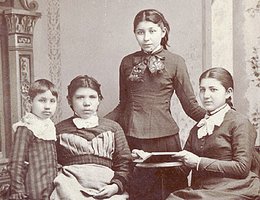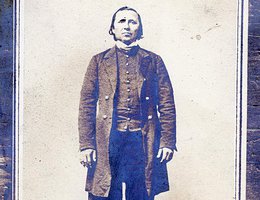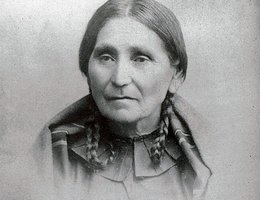

Notable Nebraskan, Susan La Flesche Picotte was born on the Omaha reservation in northeastern Nebraska on June 17, 1865. She became the first Native American to earn a medical degree.
Susan’s father, Joseph La Flesche, also known as Iron Eye, was the last recognized chief of the Omaha. He had a big impact on Susan’s life. He encouraged his people, especially his children, to seek education. Susan and the other La Flesche children all were leaders who continued their father’s legacy of helping the Omaha make the painful transition to white society while still holding onto their own culture.

While teaching at the Quaker Mission School on the Omaha Reservation, Susan La Flesche nursed the ill ethnologist and advocate of the Omaha, Alice Fletcher. Fletcher urged La Flesche to go back to school to get a medical degree.
In 1886, La Flesche attended the Women's Medical College of Pennsylvania at Philadelphia. In 1889, she graduated with a medical degree, not only one year early but first in her class of thirty-six members as well.
After earning her medical degree, it was back to the Omaha Reservation for long, hard work. Dr. La Flesche was the reservation's only doctor, and she cared for more than a thousand people.
As a doctor, it was easy for Dr. La Flesche to see how changes caused by having to live in a white world were hurting her people. She did a great deal to help her people understand that they needed to make changes to protect their health. Dr. La Flesche wrote to the Commissioner of Indian Affairs about alcoholism and tuberculosis.
In 1894 Susan La Flesche married Henry Picotte. (Her sister, Marguerite, married Henry’s brother, Charles!) Henry and Susan had two sons, Carl and Pierre. After her marriage, Susan settled with her husband at Bancroft, Nebraska and set up her own private practice, providing medical care for both Native and European Americans. At the same time, Dr. Picotte cared for her family, her ill mother, and later, her ailing husband.

After her husband died in 1905, Susan and her boys moved to Walthill where they helped build a house and a hospital, the first hospital on a reservation not funded by government money.
The hospital built for Susan La Flesche Picotte existed until the late 1940s. Later it served as a care center for the elderly. In 1989, the building was restored, and it now displays photos and artifacts from Susan’s life. Named the Susan La Flesche Picotte Center, it commemorates her medical work and her life, dedicated to the welfare of her people.
Susan La Flesche Picotte spent her life learning about health and then bringing that knowledge to the Omaha through education and health care for her people. She also communicated with the Federal government about what her people needed.
Only 50 years old, she died on September 18, 1915 after an illness of three years.
Although the quality of this copy of The Walthill Times makes it difficult to read, it shows how highly Dr. Picotte was regarded in her community at the time of her death.
All of Chief Joseph La Flesche’s children were quite successful. One of Susan’s older sisters was Susette "Bright Eyes" La Flesche Tibbles, Standing Bear’s interpreter during his trial in 1879. Another older sister, Rosalie LaFlesche Farley (1861-1900) was a very smart, compassionate businesswoman. She served as a resource to her people and has been described as one of the most remarkable women of the state.
To learn more about Dr. Susan La Flesche Picotte visit the PBS Learning Media Library -